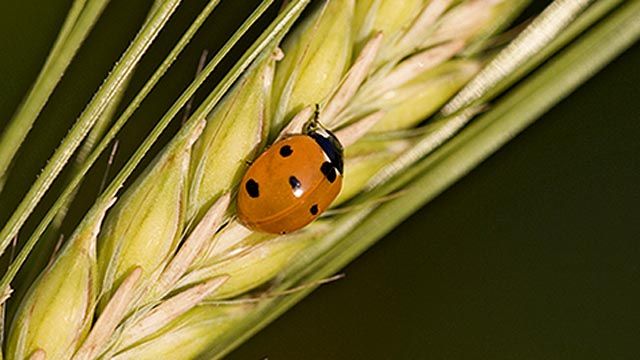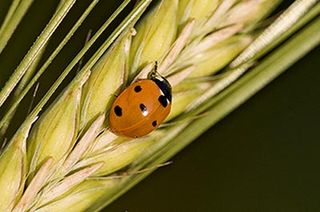Beetles prefer non-organic
A new report says wildlife doesn't prefer organic farming


One would imagine that organic farmland-which shuns pesticides and synthetic fertiliser-must be richer in wildlife. However, a review soon to be published in Biological Conservation by Sweden's Lund University concludes that organic farming is not necessarily advantageous for all creatures-news that will please the NFU, which disagrees with the EU ban on some pesticides. The report analyses 28 studies-four from the UK-comparing conventional and organic cereal growing in northern and central Europe.
It found that ground beetles and many butterflies and moths do better on organic cereal crops largely thanks to the nectar from the arable weeds that result from organically managed crops and that more bird species were associated with organic cereal growing. However, because they prey on other invertebrates, most beetles and spiders are more abundant on conventional cereal crops, partly because high-nitrogen-content fertilisers boost prey such as aphids.

The Soil Association queries the results. ‘The recent large-scale analysis by Oxford [University] looked at nearly 100 studies and found that organic farms have, on average, 34% more species than non-organic farms,' says Emma Hockridge.
‘The difference was greatest for pollinators, with 50% more species on organic farms.' Klaus Birkhofer of Lund counters: ‘Our findings don't diminish the value of organic farming for wildlife, but they do suggest that a mix of conventional and organic cereal-growing might provide the highest diversity.'
* Follow Country Life magazine on Twitter
* Subscribe to Country Life and save
Sign up for the Country Life Newsletter
Exquisite houses, the beauty of Nature, and how to get the most from your life, straight to your inbox.
Country Life is unlike any other magazine: the only glossy weekly on the newsstand and the only magazine that has been guest-edited by HRH The King not once, but twice. It is a celebration of modern rural life and all its diverse joys and pleasures — that was first published in Queen Victoria's Diamond Jubilee year. Our eclectic mixture of witty and informative content — from the most up-to-date property news and commentary and a coveted glimpse inside some of the UK's best houses and gardens, to gardening, the arts and interior design, written by experts in their field — still cannot be found in print or online, anywhere else.
-
 Can't you hear me S.O.S? Our treasured native dog breeds are at risk of extinction
Can't you hear me S.O.S? Our treasured native dog breeds are at risk of extinctionDo you know your Kerry blue terrier from your Lancashire heeler? A simple lack of publicity is often to blame for some of the UK's native dog breeds flying dangerously low under-the-radar.
By Victoria Marston Published
-
 'There are architects and architects, but only one ARCHITECT': Sir Edwin Lutyens and the wartime Chancellor who helped launch his stellar career
'There are architects and architects, but only one ARCHITECT': Sir Edwin Lutyens and the wartime Chancellor who helped launch his stellar careerClive Aslet explores the relationship between Sir Edwin Lutyens and perhaps his most important private client, the politician and financier Reginald McKenna.
By Clive Aslet Published
